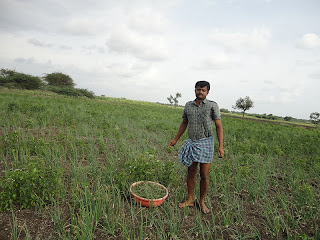Village study 05-10-2011
0
Village Study:-
To master something, one must be a humble learner, a keen observer and curios student. This philosophy is equally important for anyone who has a passion for engaging in the development of this country. In India, a country that has 70% of its population living in villages, it is only natural that a person for passion for working on issues such as poverty, welfare or product will spend time learning and understanding villagers.
Often, what we know about villages is either from images that the media paints (yellow mustard fields and melodies background music) or through the literature we read. Who among us has ever actually spent time in a village? It should be noted: spending time in villages is more than just fly—by visits.
M.S Srinivas, in his write up “The Field Worker and the Field; a village in Karnataka”, once mentioned that, “No one who has spent many nights in a village can claim to be student of village life”. Being as divers a country as its villages, India is thus multifaceted in its variety and difference. Though this village studies, module participants will engage with and in the complexities and diversity of the village life.
This module will introduce DFP fellows to an invaluable compressive learning experience; the village stays. The idea of this module is not only to understand the village’s rich and intriguing complexities, but also to challenge perception or views that one may already have. This module will take a fellow on a journey to both learn and unlearn and rural life, through discovery to see and perceive things and people in a different light. A secondary objective of this module is that fellows will learn to synthesize information and translate it into a constructive catalyst project.
The village stay entirely dedicated to proving fellows with an unstructured space for exploring rural lives, challenging one’s own perception, and forming a new more informed view of village systems. Fellows will be encouraged not to focus on certain aspects of village life, but rather learn to see life in the village as an interwoven fabric of social, economic, political and human relationships, just as human life is.
Expected objectives:-
Ø To explore village life, just as it is
Ø To understand what shapes interactions between different population residing in
Ø The village and how those interactions happen
Ø To develop an empathetic view of village life, i.e to learn “to learn to see the village from a villager’s eyes”
Ø To synthesize observation, experience and learning into a reflective village study document
Ø To learn to conceive one’s own role as a change catalyst in the village s/he has studied
Expected Outcome:-
Ø Development of a comprehensive and empathetic view of village life
Ø Skill in the making connections regarding how lives in rural areas are constricted, how does rural ares function, and why
Ø Assimilation of lesions and observations as comprehensive document














